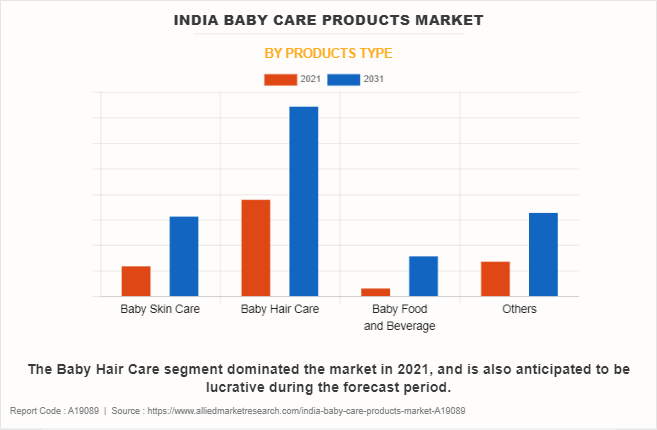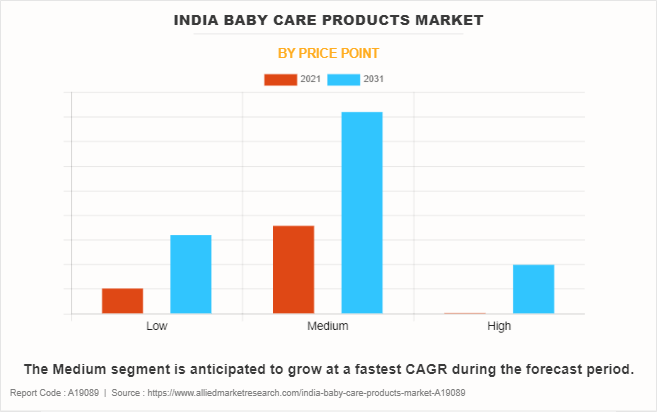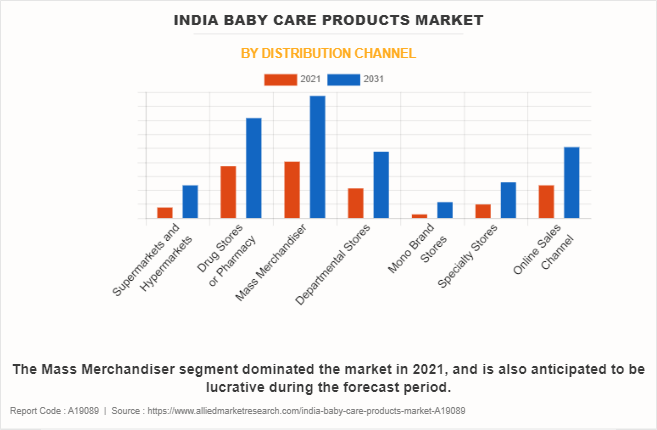The India baby care products market experiences constant evolution, influenced by a multitude of factors. An essential driving force behind this evolution is rise in the awareness and importance placed on infant hygiene and well-being. Present-day parents are more knowledgeable and conscientious about the products they choose for their babies. This heightened awareness has resulted in surge in demand for high-quality baby skin care, hair care, food, and beverage products. Consequently, the market has witnessed substantial growth over the years.

Moreover, increase in population of infants and toddlers in India is another factor that contributes to the expansion of the market. With a significant demographic of young parents, the demand for baby care products continues to rise steadily. In addition, increase in urbanization, prevalence of dual-income families, and change in lifestyles have propelled the market as parents actively seek convenient and effective solutions to cater to their children's needs.

On the other hand, the market encounters certain limitations. The price sensitivity of Indian consumers stands out as a significant obstacle. In a country where a considerable portion of the populace belongs to the middle- or lower-income brackets, affordability plays a crucial role in the acceptance of products. Consequently, the market becomes segmented, with products classified into low, medium, and high price ranges. Moreover, manufacturers face difficulties due to strict regulations concerning product safety and quality. Complying with numerous standards and certifications is a burdensome and time-consuming endeavor, ultimately affecting the overall market scenario.

However, abundant opportunities are present within these challenges. This includes rise in the prevalence of the internet and e-commerce in India has created fresh possibilities for the distribution of baby care products. Online sales platforms have become increasingly popular, enabling consumers to conveniently browse and buy a diverse array of products. This transformation in the distribution channel has proven to be a significant catalyst for both consumers and businesses.

The India baby care products market is segmented into products type, price point, and distribution channel. Further, on the basis of products type, the market is segregated into baby skin care, baby hair care, baby food & beverage, and others. By price point, it is classified into low, medium, and high. Depending on distribution channel, the market is fragmented into supermarkets & hypermarkets, drug stores or pharmacy, mass merchandiser, departmental stores, mono brand stores, specialty stores, and online sales channel.
Baby skin care products remain the dominant force in the market, as they prioritize the delicate nature of a baby's skin. However, the baby food and beverage segment is experiencing growth, driven by rise in demand for safe and nutritious options for infants. With an evolving understanding of babies' nutritional needs, this segment is expected to witness substantial expansion. The market is characterized by fierce competition, with a wide range of players, including both established brands and new entrants, competing for market share. This competitive environment fosters innovation and encourages companies to explore innovative pricing strategies and distribution channels.
Manufacturers in the India baby care products market holds a great importance on new product development and R&D. Their constant endeavor is to produce products that are safer and innovative. To achieve this, significant investments are made in R&D to comprehend the specific demands of baby care, including skin sensitivity and necessity for gentle, hypoallergenic components.
Furthermore, pricing strategies within this market exhibit significant diversity, catering to distinct segments. Products offered at lower prices are aimed at budget-conscious consumers, whereas higher-priced products prioritize premium quality and features. Medium-priced products, on the other hand, strive to achieve a harmonious blend of quality and affordability. In addition, dynamic pricing strategies are implemented, incorporating discounts and promotions during festive seasons or special occasions.
The Porter’s five forces analysis analyzes the competitive scenario of the India baby care products market and role of each stakeholder. These forces include the bargaining power of suppliers, bargaining power of buyers, threat of substitutes, threat of new entrants, and competitive rivalry.
New entrants face significant challenges in establishing themselves in the market due to existing brand loyalty and strict regulations. Building trust and adhering to safety standards is difficult for new players, thus the threat of new entrants is low. The bargaining power of suppliers is moderate, as manufacturers often have established relationships with them. However, any price increases or shortages impact production costs and ultimately affect consumer prices.
The bargaining power of buyers is high due to abundance of choices available in the market. Companies maintain quality and meet customer expectations to retain their market share. The threat of substitutes is moderate, as commercial baby care products offer convenience and assurance that homemade solutions provide. Competitive rivalry among existing competitors is intense, with constant innovation, price wars, and marketing campaigns to capture and retain customers.
A comprehensive SWOT analysis analyzes the internal and external environment that possess strengths, weaknesses, opportunities, and threats. The company's strengths consist of expansion of knowledge of infant care and cleanliness, varied selection of products that cater to requirements, and rise in demand for organic and natural items. However, company has weaknesses such as consumer price sensitivity, strict regulations and compliance standards, and competition from established players. The company takes advantage of opportunities such as rise of urbanization and dual-income households, emergence of e-commerce and online sales channels, and focus on innovation and R&D. Nevertheless, the company is aware of potential threats such as intense market competition, economic fluctuations and consumer spending, and change in consumer preferences and trends.
Key market players are Johnson & Johnson, Procter & Gamble, Nestlé, Himalaya Herbals, Dabur, Kimberly-Clark Corporation, Patanjali Ayurved, Mead Johnson Nutrition, Mothercare, and Philips Avent.
Key Benefits for Stakeholders
- Enable informed decision-making process and offer market analysis based on current market situation and estimated future trends.
- Analyze the key strategies adopted by major market players in India baby care products market.
- Assess and rank the top factors that are expected to affect the growth of India baby care products market.
- Top Player positioning provides a clear understanding of the present position of market players.
- Detailed analysis of the India baby care products market segmentation assists to determine the prevailing market opportunities.
- Identify key investment pockets for various offerings in the market.
India Baby Care Products Market Report Highlights
| Aspects | Details |
| Forecast period | 2021 - 2031 |
| Report Pages | 86 |
| By Products Type |
|
| By Price Point |
|
| By Distribution Channel |
|
| Key Market Players | Nestle, Mothercare, Johnson & Johnson, Pigeon, Mamy Poko, Chicco, s Little's, Dabur, Himalaya Herbal BabyCare, Biotique |
The India Baby Care Products Market is estimated to reach $1.9 billion by 2031
Johnson & Johnson, Nestle, Pigeon, Chicco, Himalaya Herbal BabyCare, Dabur, Mamy Poko, Mothercare, s Little's, Biotique are the leading players in India Baby Care Products Market
1. Enable informed decision-making process and offer market analysis based on current market situation and estimated future trends.
2. Analyze the key strategies adopted by major market players in india baby care products market.
3. Assess and rank the top factors that are expected to affect the growth of india baby care products market.
4. Top Player positioning provides a clear understanding of the present position of market players.
5. Detailed analysis of the india baby care products market segmentation assists to determine the prevailing market opportunities.
6. Identify key investment pockets for various offerings in the market.
India Baby Care Products Market is classified as by products type, by price point, by distribution channel
Loading Table Of Content...
Loading Research Methodology...


